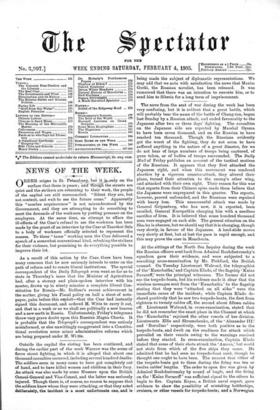The news from the seat of war during the week
has been very confusing, but it is evident that a great battle, which will probably bear the name of the battle of Chang-tan, began last Sunday by a Russian attack, and ended favourably to the Japanese after two or three days' fighting. The casualties on the Japanese side are reported by Marshal Oyama to have been seven thousand, and on the Russian to have reached ten thousand. Though the Russians evidently got the worst of the fighting, they do not seem to have suffered anything in the nature of a great disaster, for we do not hear of large numbers of troops being captured, of guns taken, or of bodies of troops surrounded. The Daily Mail of Friday publishes an account of the tactical motives of the Russians. It appears that they first attacked the Japanese right, and when this movement was rendered abortive by a vigorous counter-attack, they altered their plans, turned their attention to the enemy's other wing, and attacked with their own right. Their reason for this was that reports from their Chinese spies made them believe that the Japanese were unprepared in this quarter. The reports, however, proved unfounded, and the Russians were repulsed with heavy loss. This unsuccessful attack was made by General Gripenberg, who has now, it is reported, been recalled, General Kuropatkin charging him with a needless sacrifice of lives. It is believed that some hundred thousand men were engaged on each side. The general situation on the Sha-ho is obscure, but we should say that it is changing, though very slowly, in favour of the Japanese. A land-slide moves very slowly at first, but at last the pace is rapid enough, and this may prove the case in Manchuria.










































